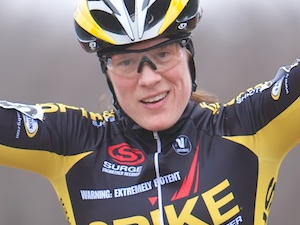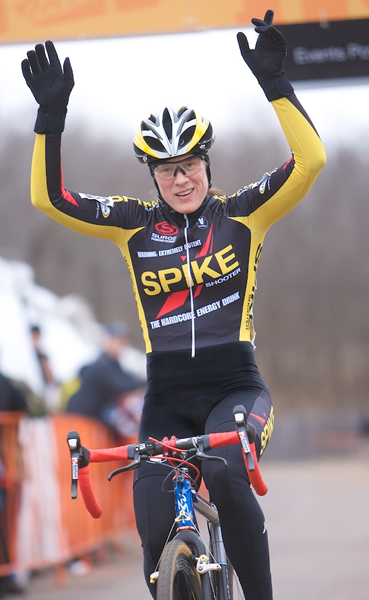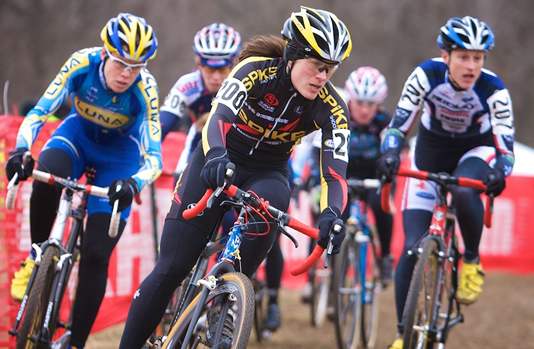
Straight Outta Compton
Katie Compton: The Velocity Nation Interview
by Jason Gay
Â
Photos courtesy Cyclocross Magazine and Joe Sales.
Â
In women’s cyclocross in the United States, there is Katie Compton — and then there is everyone else. On December 14, the 30-year-old Colorado resident won her fifth straight national championship, riding away from the field in Kansas City. But Compton’s main goals are still to come in Europe: after racing a string of World Cup races this year, next up is a date with the World Championships, a race she finished second in last year.Â
Â
1. This season, after winning at Cross Vegas, you focused on World Cup races in Europe — have you been happy with how your season is going?
Â
I’m really happy with the way my season is going so far. After suffering a lot of disappointment at the beginning of the season fromÂ
missing the 1st WC due to my leg issues, being able to recover from that and still ride strong is very special to me. I love riding and racing my bike and experiencing the lows of having to pull out of a WC and the highs of winning a WC 6 weeks later is amazing. Feeling so badly after dropping out makes the win feel so much more rewarding. And plus, losing builds character and only makes me stronger in the long run.
Â
2. Now you’re back training in Colorado, getting ready to go back overseas for Worlds. What sorts of things are you doing to train?
I’m still focusing on developing cross specific skills and power. Cross is a different animal than the other disciplines of bike racing and I believe a different skill set is required to be a strong cross racer, so I’m focusing my training on what will benefit me the most in a cross race. I guess the shortest answer to that question is to say is I’m working on my efficiency, my ability to accelerate quickly and recover quickly from the intense efforts. I’m also working on my technical and bike handling skills.
Â
 3. Obviously you’ve done very well internationally—second at Worlds last year—but what motivated you to spend more time in Europe this year?
3. Obviously you’ve done very well internationally—second at Worlds last year—but what motivated you to spend more time in Europe this year?
I really wanted to gain more experience racing at the top level of the sport since the courses and the racing is different than it is in the US. I also wanted to race as many of the WC races as I can because the UCI is offering an overall prize list for the women this year. It’s hard for me to logistically do all the races I want so I have to pick and choose the ones that are most important to me.
 4. How is the women’s cross scene in Europe? How are the crowds? Bigger? Louder?
The women’s cross scene is at the elite level is very good. It’s not quite so good for beginner women and smaller local races since most races only have a class for the junior men and the women have to race with them. The crowds are huge though and it’s really fun to race when you have people making noise all over the course. I do, however miss the heckling and cow bells we enjoy at almost all the US races and also the crazy spectators in Portland. There are definitely no spectators in the world that are comparable to Portland’s crowd.
Â
 5. Where are you based in Europe and what¹s your day-to-day life like over there?
Â
When we are in Belgium, we stay with a wonderful host family that lives in Kalmthout. Kalmthout is a small town about 45min north of Antwerp on the western part of Belgium (close to the Netherlands). Our day to day life is pretty simple. We sleep in till the sun comes up (about 8:30-9am) then ride mid-day and do some work (my husband and I both do some coaching) and then maybe go for a walk in the evening and also read a lot. The days are short so by the time we get back from our ride, wash bikes (Mark does this), shower and eat, it’s dark out again.
Â
 6. We’ve heard from racers like Barry Wicks and Tim Johnson about how much harder the racing is in Europe — would you say it¹s a comparableÂ
 difference in the women’s field?
Â
It’s probably a little easier for American women to do well over there than it is for the American men. Mainly because the talent pool there is much deeper on the men’s side. And since it is still a male dominated sport there, women are more hesitant to get into racing cross. There also aren’t a lot of races for women so it is harder for women to improve. In the US, women can race twice a weekend every weekend during the season if they want to, but in Belgium there may be a race every other weekend and never back to back days and half of those races will have a small turnout of women since they don’t even have their own category, they just get grouped with the junior boys.
Racing in Belgium is still harder than it is here, but for the women it’s mainly because the courses are more challenging and most of the time they are always wet and usually there is an “oh shit!” factor in the course every time which makes for harder and more exciting racing. The women there are also more aggressive and the majority have good bike handling skills since they start riding bikes to school at pre-school age.
Â
7. How is the prize money and sponsorship situation for women’s cross these days?
The prize money for some of the racing here is getting better, it all depends on whom the promoter is. Some will pay equal prize money to the women which is awesome and something we all really appreciate. I will actually travel to races when the promoter is advertising that because I want to support their efforts as well as I have an opportunity to win enough to cover my expenses.
Â
The sponsorship front is always hard since getting products for women is tough in general, but I have been pretty lucky with my sponsors. I have a few that take really good care of me and do everything possible to make sure I have what I need. We choose sponsorship by making sure the product is great so we can feel confident promoting it and also want to work with sponsors that are good people. I can’t promote a product if I don’t believe in it, so we make sure to run equipment that truly works well and is something on which I can win.
Â
8. What drove you to get into cyclo-cross in the first place?Â
Â
Drinking too much one night in college and it sounded like a good idea then. It didn’t feel so good racing hungover the next day, but I raced on my single speed mtb and won and had an awesome time. I was hooked at that point. I figured if I can feel that badly, still race pretty well and have a great time doing it then it is something I should do more.
I was also a big girl with quite a bit of power but couldn’t climb very well (the whole big girl thing) so cross was a perfect discipline for me, all the intensity without any hills.
Â
 9. When did you think, “Hey, I am pretty good at this?â€
Â
After my first season racing cross, I felt I was just naturally good at it. I’ve been riding bikes for so long and had a road, track and mtb background so cross was the perfect fit for me. All the skills I needed to race cross well, I learned after 10 years of racing the other disciplines.
Â
10. In terms of your own race preparations, what kinds of things do you do to get ready on the day of a competition?
Â
I don’t do anything special. Get a good night’s sleep, eat a nice breakfast, do the proper warm-up and course pre-ride and then race.
Â
11. What¹s one piece of cross equipment that is worth investing in?
Â
A nice light and stiff frame that has the right geometry and fits right.
12. What’s one piece of cross equipment that’s probably not worth spending $$ on?
A single chainring set-up.
Â

Â
13. Some people might not know you’re a multiple gold medalist on the track in the Paralympic Games riding a tandem track bike with Karissa Whitsell, a blind athlete. How did you get started in that?
Â
I worked with the coach of the Paralympic cycling team and he was looking for a pilot that would have the experience to race a tandem on the road and the track and who wasn’t competing at the top level of the sport any longer and I happened to be that person. Karissa and I did a couple rides together and realized we made a good team and with some quality training and more time together we developed into a great tandem team.
14. How did the dynamic work on the bike between you and Karissa?
We worked really well with each other till the last year we raced together. Our riding styles were similar so we pedaled efficiency, sprinted out of the saddle really well together, climbed well and just meshed easily. I always knew we were riding well when we got out of the saddle and it was so smooth I almost forgot I was on a tandem. Karissa adapted well to letting me lead and was a great stoker (name for rider on the back of the bike), leaned at the right times and applied pressure to the pedals at the right times.
15. As your career progresses what are your goals down the road — are there other events/disciplines you want to try on the bike?
Right now I’m focusing on cross and that is my main thing to do because it is the most fun for me and I’m doing well with it. I already did the road and track thing and still race on the track in Colorado Springs in the summer so I’m kinda over that. I still race some mountain bike and will do more of that in the future but don’t have any specific goals in that department.
Â
16. General question, but how would you assess the female bike racing scene in the United States? Are our cycling agencies doing enough? Is the economic crisis going to put a hurt on sponsorship?
Â
I think the women’s racing scene is growing more and more in the US, especially on the cross side of things. The cross scene is so inviting and fun that women seem to get involved with that discipline before road or mountain bike. The racing is easily accessible and it’s a great environment to learn and doesn’t take the whole day to do it. You can also get a full cross bike for a relatively inexpensive price to get you started. The leaning curve isn’t as steep either, not like riding in a pack like you would in a crit or having to bomb down a technical downhill on a mtb; if you make a mistake on a cross bike the damage isn’t as big.
Â
17. One of your key sponsors is the energy drink Spike Shooter. What is the maximum number of Spike Shooters you have consumed in one setting?
I only need one can in one sitting, that is plenty of energy for the day. They also came out with an energy drink called Spike Shotgun which is bigger so there is more to drink but has the same energy as the little can with a slightly different recipe. The drink is awesome for driving long distances or when you have to be productive; it’ll keep you awake and focused for quite a few hours. The most I have drunk in 24hrs is 3 cans and that was to stay awake to drive through Wyoming in the middle of the night.
Â
 18. Last question: this year New York City had its first cyclocross event in years, out on Staten Island. Can make everyone come in 2009? And ifÂ
 you want to race, the sponsors will send you a private jet and fetch you!
Â
That sounds awesome! And a private jet? That means I’m really moving up in the world! What’s the date?
Â

JGIA
awesome interview!
i like this woman.
Jason this is great!
Eloy
Thanks Katie
…straight outta Katie Compton
is a sista that’ll smother yo’ father.
and make ya brother think I love him.
Dangerous fatherfucker raises hell
And if I ever get caught I make bail
See, I don’t give a fuck, that’s the problem
I see a motherfuckin pseudo journo I don’t dodge him
But I’m smart, lay low, creep a while
And when I see a punk cyclist pass, I smile
To me it’s kinda funny, the attitude showin a milk sista drivin
but don’t know where the fuck she’s going, just rollin
lookin for the one they call Katie C.
But here’s a flash, they never seize me
Ruthless! Never seen like white in rice
except when I unload, see I’ll get over the hesitation
and hear the scream of the one who got the last penetration
Give a little gust of wind and I’m jettin, pacelinin’
But leave a memory no one’ll be forgettin
So what about the bitch who got dropped? Fuck her!
You think I give a damn about a Vanderkitten bitch? I ain’t a sucker!
This is the autobiography of the C, and if you ever fuck with me
You’ll get taken by a stupid dope sista who will smother
word to the motherfucker, straight outta Katie Compton!